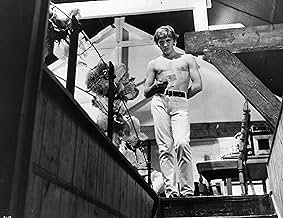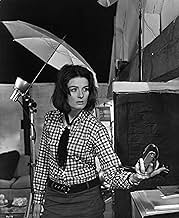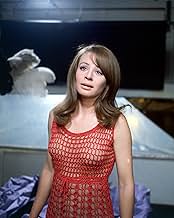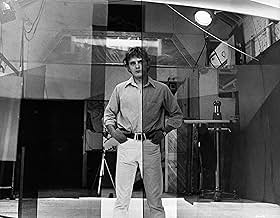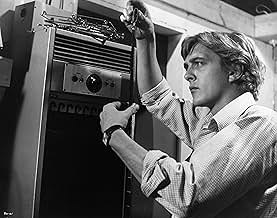Ein Londoner Fotograf entdeckt ein sehr verdächtiges Detail auf einem Foto, das er von einer geheimnisvollen Schönheit in einem verlassenen Park geschossen hat.Ein Londoner Fotograf entdeckt ein sehr verdächtiges Detail auf einem Foto, das er von einer geheimnisvollen Schönheit in einem verlassenen Park geschossen hat.Ein Londoner Fotograf entdeckt ein sehr verdächtiges Detail auf einem Foto, das er von einer geheimnisvollen Schönheit in einem verlassenen Park geschossen hat.
- Für 2 Oscars nominiert
- 8 Gewinne & 9 Nominierungen insgesamt
Veruschka von Lehndorff
- Verushka
- (as Verushka)
Jeff Beck
- Self - The Yardbirds
- (Nicht genannt)
Roy Beck
- Boy dancing In Ricki Tick Club
- (Nicht genannt)
Charlie Bird
- Homeless Man
- (Nicht genannt)
Susan Brodrick
- Antique shop owner
- (Nicht genannt)
Robin Burns
- Homeless Man
- (Nicht genannt)
Tsai Chin
- Thomas's receptionist
- (Nicht genannt)
Julio Cortázar
- Homeless Man
- (Nicht genannt)
Chris Dreja
- Self - The Yardbirds
- (Nicht genannt)
Empfohlene Bewertungen
'Blowup' is frequently mentioned as one of the most influential movies of the twentieth century. And I believe it is. But it is no dry and dull document that the viewer must force himself to "appreciate" while he stifles his yawns. Like 'Citizen Kane', 'Breathless' and 'Psycho' it is not only an important movie milestone, it is still a living and breathing work of art that will fascinate and impress any movie lover who approaches it with an open mind. 'Blowup' lures you in with its snapshot of swinging 60s London, and it's tease of being a murder mystery, which it really isn't, but by then you're hooked. This movie is a puzzle with no solution, a text with any interpretation the viewer cares to bring to it. That may sound heavy going and off putting, but this is a surprisingly watchable movie. Even the "boring" sequences are interesting! Anyone who enjoys David Lynch, Dario Argento (whose 'Profundo Rosso' deliberately referenced this), Nic Roeg or Jim Jarmusch, movies where atmosphere and visual images are more important than characterization, plot or dialogue, will appreciate this 60s classic. I think it gets better with every viewing.
Some interpret this existential film to mean that human reality is defined in the context of the group, not the individual. Hence, in the film, to Thomas (David Hemmings), the murder did occur. But, the murder's "reality" is objective only if Thomas can verify it through someone else's experience. Otherwise, Thomas' observed event is subjective and problematic. Each individual thus sees through a glass darkly ... even when the glass is an "objective" camera lens. Ironically, the same could be said for Antonioni.
This film came out only three years after the JFK assassination. I find it hard to believe that that event did not play into this film to some extent. There are all kinds of references to the assassination: the grassy area and picket fence; photographic evidence of a "badge man" character with gun hiding in the bushes; the subsequently developed pictures having been presumably stolen or altered as part of some conspiracy. It's almost as if Thomas and his camera represent the Zapruder film component of the assassination. Indeed, the causal "reality" of the JFK murder was, and still is, to some extent a function of human perception, derived from an interpretation of what the camera sees.
"Blowup" is unlike most films. There are long takes, with minimal editing. This gives the film a slow, meandering feel. Dialogue is minimal. Natural sounds override music, throughout. And like other Antonioni films, this one is mostly visual. The cinematography is striking.
Another characteristic is that the film is not plot intensive. Nor are the characters sympathetic. Thomas is not at all likable. And other characters are mere mannequins. I question whether Antonioni needed two hours to convey his message. More of a plot might have reduced the need for so much seemingly irrelevant filler.
"Blowup" is mostly for viewers who like unconventional, arty films that impart abstruse philosophical "meaning". The film is therefore aimed at people who like to think and ponder.
This film came out only three years after the JFK assassination. I find it hard to believe that that event did not play into this film to some extent. There are all kinds of references to the assassination: the grassy area and picket fence; photographic evidence of a "badge man" character with gun hiding in the bushes; the subsequently developed pictures having been presumably stolen or altered as part of some conspiracy. It's almost as if Thomas and his camera represent the Zapruder film component of the assassination. Indeed, the causal "reality" of the JFK murder was, and still is, to some extent a function of human perception, derived from an interpretation of what the camera sees.
"Blowup" is unlike most films. There are long takes, with minimal editing. This gives the film a slow, meandering feel. Dialogue is minimal. Natural sounds override music, throughout. And like other Antonioni films, this one is mostly visual. The cinematography is striking.
Another characteristic is that the film is not plot intensive. Nor are the characters sympathetic. Thomas is not at all likable. And other characters are mere mannequins. I question whether Antonioni needed two hours to convey his message. More of a plot might have reduced the need for so much seemingly irrelevant filler.
"Blowup" is mostly for viewers who like unconventional, arty films that impart abstruse philosophical "meaning". The film is therefore aimed at people who like to think and ponder.
Blow Up is the quintessential 60' s movie with a roster of talented British actors, colourful mod fashions (now back in vogue), dreary post-war London locations and empty streets, groovy music by American composer extraordinaire Herbie Hancock and an Italian director and writer in love with the whole scene. Blow Up is the cinematic equivalent of the TR4 cabriolet, designed by Michelotti and manufactured by Triumph during the same period, and mixes the best of two rather different cultures. The movie offers the right amount of nudity, sensuality and perversion without offending the prude status quo of swinging Olde England. David Hemmings plays a character who is by all accounts snobbish, homophobic, prejudiced, rude and macho. This pseudo thriller/whodunit unwinds rather slowly and with little dialogue and, I think, is just an excuse for Antonioni to show how weird the English were. A must see flick for the ones nostalgic or who missed the 60' s completely.
BLOW-UP is NOT "about the possible dehumanizing effects of photography..." but rather a movie version of the philosophical question: "If a tree falls in the forest and no one hears it, does it make a sound?"
In this case, if a murder is committed and there is no evidence, did it really happen?
While seemingly about a successful, but hedonistically superficial, photographer who films both wartime brutalities and fashion, Thomas (David Hemmings) comes to finally realize that his images only create an illusion of the real world.
He discovers that he has accidentally photographed a murder when he develops and enlarges ("blows up") the images of photographs taken of a couple in an otherwise deserted park. He even returns to the scene and finds the victim's body. But when the photographs AND the negatives AND the body disappears AND there is no report of a missing person, he discovers that he has no evidence of a murder having occurred.
In the end, when he throws back the imaginary tennis ball to the pantomime players on the tennis court, he realizes that what he accepts as reality is really only an illusion.
In this case, if a murder is committed and there is no evidence, did it really happen?
While seemingly about a successful, but hedonistically superficial, photographer who films both wartime brutalities and fashion, Thomas (David Hemmings) comes to finally realize that his images only create an illusion of the real world.
He discovers that he has accidentally photographed a murder when he develops and enlarges ("blows up") the images of photographs taken of a couple in an otherwise deserted park. He even returns to the scene and finds the victim's body. But when the photographs AND the negatives AND the body disappears AND there is no report of a missing person, he discovers that he has no evidence of a murder having occurred.
In the end, when he throws back the imaginary tennis ball to the pantomime players on the tennis court, he realizes that what he accepts as reality is really only an illusion.
I realize that this is a cinema classic, taught in cinema courses everywhere. And I recognize that there is some pretty remarkable stuff here. But some of it I found very off-putting.
First, to the good: the cinematography is almost constantly remarkable. The way scenes are framed, the constant variation of camera angles, the switches between close and far, etc. I almost would have preferred this without sound. There was so much of interest to watch.
There was little of interest to hear, however. The dialogue is inane. And the protagonist is an egotistical, selfish, thoroughly repugnant excuse for a man. Maybe he's alienated from his world. Why would I care? He does everything to demonstrate that he cares about nothing and no one but himself.
Just past the midpoint of this movie, it starts to become interesting when the photographer detects something in the background of one of his photos. When it turns out a man was murdered, he wants to know more. But why? He's never shown any interest in anything other than himself up until then?
And, finally, he seems to forget about it all.
Watch this once for the amazing camerawork. But as for the plot, the characters, and the rest, don't expect to be engaged. I certainly wasn't.
First, to the good: the cinematography is almost constantly remarkable. The way scenes are framed, the constant variation of camera angles, the switches between close and far, etc. I almost would have preferred this without sound. There was so much of interest to watch.
There was little of interest to hear, however. The dialogue is inane. And the protagonist is an egotistical, selfish, thoroughly repugnant excuse for a man. Maybe he's alienated from his world. Why would I care? He does everything to demonstrate that he cares about nothing and no one but himself.
Just past the midpoint of this movie, it starts to become interesting when the photographer detects something in the background of one of his photos. When it turns out a man was murdered, he wants to know more. But why? He's never shown any interest in anything other than himself up until then?
And, finally, he seems to forget about it all.
Watch this once for the amazing camerawork. But as for the plot, the characters, and the rest, don't expect to be engaged. I certainly wasn't.
Wusstest du schon
- WissenswertesThe film contains a rare performance of The Yardbirds during the period when Jimmy Page and Jeff Beck were both in the band. Jeff Beck would leave a few months later.
- PatzerWhen Thomas is frolicking with the two girls on the purple paper backdrop in the studio, two crew members, including a camera operator, can be seen just sitting there in the top right side of the frame.
- Alternative VersionenSome of the music was rescored for the Warner DVD release, namely the latter part of the opening title music. The VHS releases' music remain intact.
- VerbindungenFeatured in Film Review: How I Learned to Live with Being a Star (1967)
- SoundtracksMain Title (Blow-Up)
Written and Performed by Herbie Hancock
Top-Auswahl
Melde dich zum Bewerten an und greife auf die Watchlist für personalisierte Empfehlungen zu.
- How long is Blow-Up?Powered by Alexa
Details
- Erscheinungsdatum
- Herkunftsländer
- Offizieller Standort
- Sprache
- Auch bekannt als
- Deseo de una mañana de verano
- Drehorte
- Maryon Park, Woolwich Road, Charlton, London, England, Vereinigtes Königreich(scenes where Thomas first photographs Jane and where mime artists play tennis at the end)
- Produktionsfirmen
- Weitere beteiligte Unternehmen bei IMDbPro anzeigen
Box Office
- Budget
- 1.800.000 $ (geschätzt)
- Weltweiter Bruttoertrag
- 38.575 $
- Laufzeit
- 1 Std. 51 Min.(111 min)
- Sound-Mix
- Seitenverhältnis
- 1.85 : 1
Zu dieser Seite beitragen
Bearbeitung vorschlagen oder fehlenden Inhalt hinzufügen



